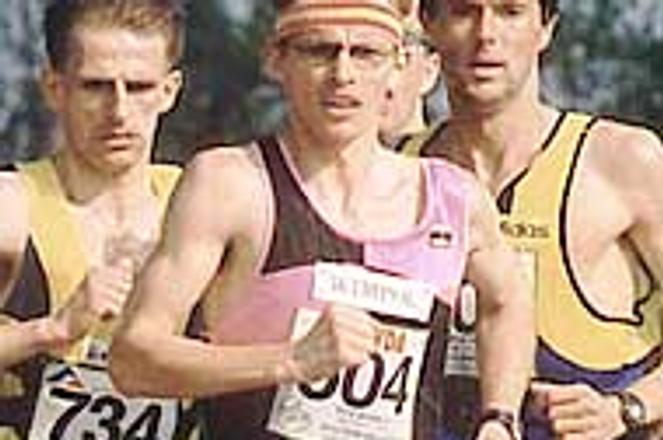0VER 500 athletes participate in the Danube marathon every year.photo: Courtesy of Iames
FOR the last decade, Bratislava has been the only capital in the world hosting a sporting event crossing national borders. Organised for the first time in 1991, the Danube Marathon symbolised the optimistic spirit of the country after it reunited with western Europe following the fall of communism.
But this year, due to a shortage of sponsors, the marathon has been scrapped, threatening the continuance of the young tradition.
"A bib number in the Danube Marathon used to be equal to a passport," said Jaroslav Oršula from Bratislava's Iames Marathon Club, which organises the marathon (competitors used to be vetted by Slovak and Austrian police before the event to avoid having to present passports at the border).
"Athletes from Libya, Morocco, Tunisia and Ukraine have been surprised that they were able to cross the Austrian border so easily. And for Slovakia, it meant an opening to the world."
But when the event's main sponsors decided this year to cancel financial support, the marathon's April 27 start date was scrubbed. In Slovakia's ongoing process of privatisation and corporate restructuring, new management boards of former major sponsors have been unwilling to support the event.
While organisers managed to sign 15 contracts with sponsors for the 2001 marathon, this January came and went without a single donor.
photo: Courtesy of Iames
The biggest past sponsor, the Slovnaft refinery, used to donate Sk500,000 ($10,638) annually, almost one-third of the total Sk1.5 million ($32,000) required to stage the event. However, after the Hungarian oil and gas company Mol acquired a 36 per cent stake in Slovnaft in 2000, the sponsorship was cancelled. "Mol refused to prolong the contract," said Oršula.
Other major sponsors had similar reasons for cancelling contracts. Insurance company Slovenská poisťovňa used to donate Sk250,000 ($5,300) before it was sold to the German Allianz at the beginning of this year. The Allianz branch in Slovakia, which also used to donate money to the event, cancelled its sponsorship after the purchase as well.
Some smaller companies used to grant Oršula money on the basis of private contacts. The Ministry of Education supported the event with some Sk100,000 ($14,000) a year.
"We can't say that we didn't get any support from the state," Oršula said. "But the amount was sufficient only for paying for traffic police."
The Iames Club, found in 1964, initially organised mountain-climbing expeditions. The idea of starting a standard 42.195 kilometre marathon from Bratislava to the Austrian town of Hainburg and back came two years after the fall of communism in 1989. Five hundred athletes participated in the first run, which traced the route Slovaks took into Austria directly after the opening of the borders in 1989.
In 1994 Iames also started to organise a half marathon from Bratislava to Hainburg, followed by a children's marathon two years later.
This year, organisers had been expecting around 650 participants from 20 countries. Starting every fall, Oršula said, over 80 per cent of his time was usually spent on finding and securing money for the marathon, with actual preparation for the event, including booking flight tickets, managing visas, securing police and health services, lasting no more than a month once sponsorship was secured.
The organisers, however, do not blame former sponsors for the fate of the event. Instead, they say, they are concerned about the public's attitude towards sports events and their legislative protection in Slovakia.
"In the Czech Republic, money from lotteries is used for financing sport activities. In Slovakia, everything from Tipos, one of the largest lotteries, goes to the Ministry of Finance for sponsoring political parties. Only a small amount goes to sport activities," said Oršula.
Having failed to find sponsors for this year's marathon, the organisers do not see a bright future for the event. The half marathon and children's marathon, which stood to attract around 1,000 participants, were also cancelled.
"I'm very pessimistic," said Oršula. "Our sponsors were the strongest companies in Slovakia. Now, after being privatised, all their money goes abroad."
However, Prime Minister Mikuláš Dzurinda, an experienced long-distance runner who has run 17 marathons and recently finished 4,053 out of 30,000 participants in the 2001 New York marathon, still represents a hope.
"I'm unhappy to hear the marathon was cancelled. The organisers did not ask me personally for support, but I'll still look for a way to organise the marathon this year. Full starting lines at Slovak marathons, the great atmosphere at the oldest [Košice] marathon, and the results of Slovak representatives abroad clearly prove the future of long-distance runs in our country," he said in a prepared statement for The Slovak Spectator.
Author: Mirna Šolić


